
Part 5 - Making change happen and thinking about the future
In the final part of the course, you will:
- Learn about reframing
- Manage current challenges
- Plan ahead and set some goals
Change your thinking
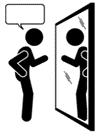 Talking to yourself, inside your head or aloud, is something that many of us do.
Talking to yourself, inside your head or aloud, is something that many of us do.
No, it does not mean that you are crazy!
It is normal to talk to yourself and it’s actually quite good for your mental health, if you are having the right conversations.

Sometimes our inner voice speaks to us in an unhelpful and negative way. This can:
- affect our thinking;
- change how we see things;
- make us feel worse;
- trigger our fight or flight stress response.

This is something that you can learn control.

Learning how to reframe your thinking trains your brain and your inner voice to stop giving you unhelpful messages.
Reframing means looking at a situation, thought or feeling from a different angle.
Taking time to reframe your thinking can also slow down your stress response.
Here are some examples of an unhelpful inner voice:
(You can find these written on page 18 of your personal logbook)

- I never get anything right
- It’s too hard, I should just give up
- I should be better than I am
- Nobody cares
- Something bad is going to happen
You may be familiar with these thoughts. In times of stress, you may have said these things to yourself.
This type of thinking is unhelpful; this is your brain pulling you down. It gets in the way of you improving your wellbeing and becoming your best self.
Reframing negative thoughts can help to pull you back up towards your best self.
To help you understand the effects of negative thoughts, watch the following short YouTube videos:
How do you reframe your thinking?
You may have heard a friend or family member say some of the things, listed above, to you.
If a friend said any of these things to you:
- What would you tell them?
- Would you agree with them?
- Would you try to help them look at their situation from a different angle?
Let’s try it out:
Imagine a friend or family member has said these things to you, what would you tell them?
You can use your logbook (page 18) or a piece of paper to write down what you would say to them.
| Negative statement | My response |
|---|---|
| I never get anything right | |
| It's too hard, I should just give up | |
| I should be better than I am | |
| Nobody cares | |
| Something bad is going to happen |
Use the space at the bottom of the list to try using a real example. Think of a time someone said something to you, or write down a negative thought of your own and respond as if you were talking to a friend.
Let’s look at your answers:
- How did you get on?
- How did you respond?
- Did you agree with them?
- Did you try to reassure them?
- Can you see that there is no proof that these statements are correct?
- Do you think it is easier to reframe someone else’s thoughts?
We have added a few more examples of negative thinking in your personal logbook for you to practice reframing.
Keep practicing

The trick is, to catch the negative thoughts when you are having them and to teach yourself to talk back to them.
The next time you catch yourself having a negative thought, tell yourself to “Stop!”
Then talk back to yourself. Think, what is going on here, what is causing me to think in this way?
Here are some questions to help you; you can find them on page 21 of your personal logbook:
- Is there any proof that what I am thinking is true?
- Is there any evidence that shows me my thought is untrue?
- Am I blaming myself for something I have no control over?
- Am I using any words that are exaggerated?
- Am I trying to read someone else’s mind and believe it is a fact?
- Do any of my past experiences show me that this is not always true?
- Am I ignoring any positives in the situation or any of my strengths?
You can choose to change your thinking and the more you do it, the easier it will become.
Reframing your thoughts also helps to slow down your stress response. This has a calming effect and means you are able to think more rationally.
Managing current challenges
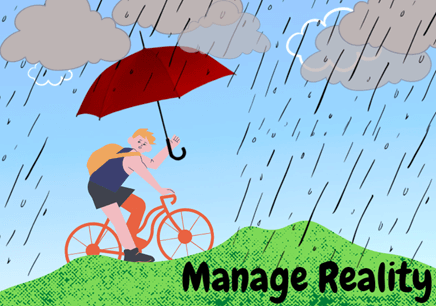
Having an understanding of our challenges, allows us to manage them better and take control of the outcomes.
You are in control of how you respond to what is happening around you and you are responsible for becoming your best self.
Taking control and making small changes can affect how you feel and, in turn, improve your wellbeing.
You are almost at the end of the course, so now is a good time to bring everything together and try out what you have learned.
Before you do this, let’s do a quick recap of what you have learned so far.
In the course, you have learned:
- What wellbeing means to you and why it is important
- What resilience is and how it gets stronger as we learn from life’s challenges
- What stress is, how it affects your body and how it can affect the people around you
- A positive way of looking at your health and wellbeing
- About your best self and how to use a scale to help you bounce back
- You have ‘tools’ that you can use to lower your stress levels
- How reframing your thinking can help to improve your wellbeing
If you bring all of these lessons together, in your daily life, you can work through anything!
Let’s try it out…
For this next activity, you will need a piece of paper, or you can use your personal logbook (page 22).
Draw 3 columns and write the following at the top of each column:
- Challenges
- What needs to happen
- Why it matters

In the first column, under the heading Challenges, make note of the challenges you are facing in your life now. It might help to work through one challenge at a time.
In the second column, under the heading What Needs to Happen, make note of what you think needs to happen for each challenge. Use what you have learned in the course to help you:
- What would make it easier for you to manage?
- Are there any tools you can use? Can somebody or something help?
- What can you do to make things better right now?
- Try reframing; what would you tell a friend to do?
In the third column, under the heading Why It Matters, make note of the reasons why it is important for you to work through it:
- Why do you care?
- Do you care what happens?
Finding meaning in life’s challenges is important; it gives you a purpose and a sense of control. If you do not care or cannot find meaning, there is no point and you are in danger of causing yourself more stress. Working out why something matters can help you decide what steps you need to take next.
You can work through this process and these questions to help you overcome any challenge you are facing. Doing this can help you prepare for the same challenges, if they happen again, and you can use what you have learned to overcome new challenges.
Planning ahead and future goals
During the course, you set yourself 3 goals.
- Have you managed to achieve them?
- Are you still working on any of them?
- Has your wellbeing improved by sticking to them?
Be kind to yourself!
If you have found it difficult to stick to your goals, try changing them to make them easier for you. Start small, you can always work your way up towards larger goals.
Setting yourself small goals that will improve your wellbeing is important. It can motivate you and give you purpose, helping you make the most of your life.
Do not make life harder than it needs to be
If there is one thing that we can be sure of, life will carry on and the challenges will keep on coming!
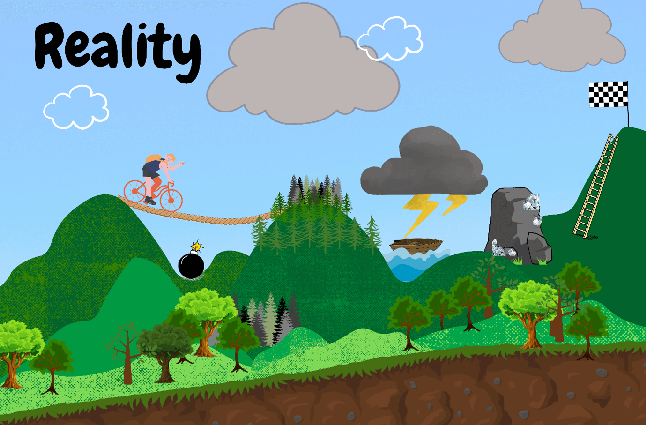
Checking in with yourself on a regular basis and keeping track of your goals can motivate you and help you to prepare for future challenges.
To help you keep on track, you will find some ‘weekly check in’ worksheets at the back of your personal logbook. The worksheets are also available to download individually or you can make your own.
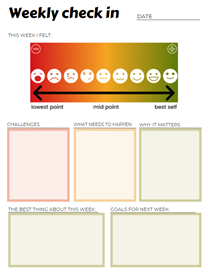
You can use these worksheets to help you:
- keep track of your goals;
- work through challenges;
- recognise the good parts your life;
- aim for your best self
Keep practicing the skills you have learned

Each time you feel yourself being pulled lower down your scale, you will be able to use your skills and tools more easily.
The more you practise, you will be better prepared and you will bounce back towards your best self more quickly.
You have reached the end of the course.
Well done for sticking with it and for making it to the end of the course.

It is not easy to change old habits. Any positive changes you can make to improve your resilience and wellbeing, no matter how small, are a big achievement.
We hope that you have enjoyed the course and that you have been able to make the changes that you need, in order to look after your wellbeing.
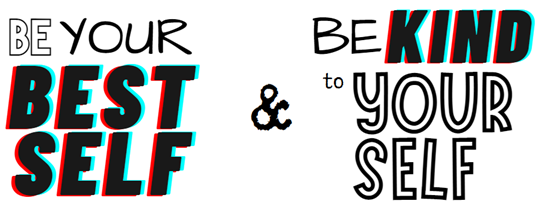
This online tool kit is a shortened version of the Carers Resilience and Wellbeing training course, which is open to all unpaid carers in Ceredigion. If you are interested in attending free, online or in person training, please contact the Carers and Community Support Team to find out when the next training course is available on 01545 574200 or email connecting@ceredigion.gov.uk.
We want to hear your thoughts about the course. Please take a few minutes to share your feedback with us. This will help us to improve the course and make it easier for other carers to access. The questions will only take 5 to 10 minutes to complete.
The Carers Resilience and Wellbeing training programme is funded by the West Wales Care Partnership and is developed by Ceredigion County Council’s Carers and Community Support Team.
If you have any questions about the Carers Resilience and Wellbeing training or the online toolkit and materials, please contact the Carers and Community Support Team connecting@ceredigion.gov.uk.
